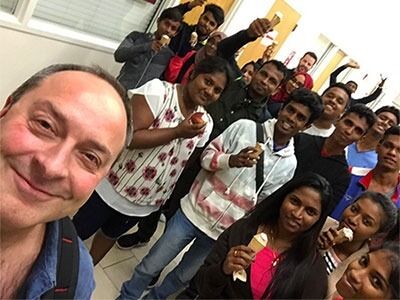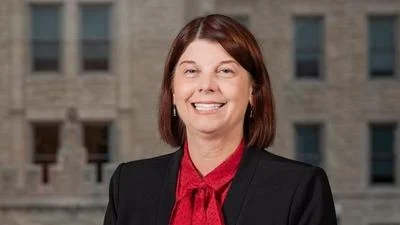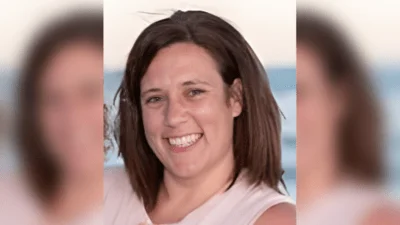Northern Illinois University issued the following announcement on Aug. 20.
Days after the Department of Kinesiology and Physical Education's Sri Lankan visitors left the NIU campus in late April, their hosts already were planning to book flights to Asia for August.
That trip began Sunday – and now includes four students who are the inaugural participants in the NIU College of Education’s Engage Global program, part of the Educate and Engage Program.
By the time they board a plane Saturday to return home, all will have gained a close-up look at a different country’s take on Teaching Personal and Social Responsibility (TPSR) through sports.
“For a lot of our students, this might be their first time leaving the country. It’s an eye-opening experience, broadening their worldview through a cultural exchange and a real immersion in a different country. The way we do things in the United States isn’t the only way it happens,” says Presidential Engagement Professor Paul Wright, NIU’s EC Lane and MN Zimmerman Endowed Professor in Kinesiology and Physical Education.
“I hope it increases their confidence and competencies as they’re growing into professionals, whether they’re coaches, strength-and-conditioning experts or working in government,” Wright adds. “Whatever their futures are, they’re going to develop self-efficacy in those leadership roles.”
Wright and KNPE faculty colleagues Steve Howell, Jenn Jacobs and Jim Ressler are joined by graduate students Karisa Fuerniss, Adam Zurbrugg (Sport Psychology) and Timothy Mack (Sport Management).
Zakyrah Harris, an undergraduate political science major who took Wright’s honors class on sport diplomacy, is also along for the journey, as are two representatives from the University of North Carolina at Greensboro.
Scheduled events include an open-to-the-public panel discussion at the U.S. Embassy on the topic of using sport for positive youth development and social change and a training workshop at a local YMCA.
NIU’s group also will oversee a day of action planning with the two dozen travelers who spent a week in DeKalb this spring as part of a series of sports diplomacy missions. They will revisit the plans drafted on the NIU campus, share updates, examine what’s happening, identify who is accomplishing the goals and tackle any obstacles met.
Consisting of four separate cultural exchanges with countries in South and Central Asia, including Sri Lanka, the program is funded by the U.S. Department of State’s Bureau of Education and Cultural Affairs through its Sports Diplomacy Division.
Virginia Commonwealth University’s Center for Sport Leadership, which received the federal grant, selected NIU to coordinate the exchange with Sri Lanka.
“We can only bring so many people to the United States, but when we’re over there, we can take 50, 60, 100 people,” Wright says.
“This is at no cost for any youth or coaches or teachers who want to learn about this approach, and it’s a refresher course for those people who were here in April. We’ll also help them deliver the workshop,” he adds. “That adds to the local relevance and context when they’re up in front of the room, and it’s good for stability after we’re gone. They’re recognized as people who know that they’re doing.”
Students will learn how to transfer their NIU classroom lessons to a real-world application, Jacobs says, “and not just in this like-minded culture but across the world in a different context.”
Other responsibilities will include evaluation of the cross-cultural program through taking field notes, making observations, shooting photographs and archiving.
All, including the faculty members, will stand “at the ready” to make classroom presentations.
“We’re not going to have a set program until we know the needs of the participants. We’re intentionally going down there with a rough plan of what we want to deliver,” Jacobs says. “We learned a lot from the Belize project that you just can’t go down there – maybe they don’t have the supplies, or they don’t have the interests. You have to keep it flexible.”
Like Wright, Jacobs expects the students will return with minds opened.
“I always learn far more from these programs than I end up teaching,” she says. “This is a war-torn country – nine years after a civil war – and the strides they’ve made in accepting people and being more inclusive, I think, is something anyone from the United States could take an example from and take that back into the classroom.”
Original source can be found here.

Source: Northern Illinois University Rockford



 Alerts Sign-up
Alerts Sign-up